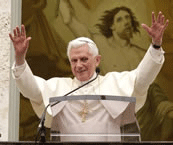Dear brothers and sisters!
The liturgical texts of this period of Advent renew the invitation to us to live in expectation of Jesus and not to cease to await his coming and thus to maintain in us an attitude of openness and availability for the encounter with him. The vigilance of heart that the Christian is always called to exercise in everyday life characterizes this time in which we prepare ourselves with joy for the mystery of Christmas (cf. Advent Preface II). Elsewhere the usual commercial messages are proposed even if perhaps in a diminished way because of the economic crisis. The Christian is invited to live Advent without letting himself get distracted by the lights so that he can fix his interior gaze upon Christ and know how to assign things their proper value. If in fact we remain "vigilant in prayer and exultant in praise" (ibid.), our eyes will be able to recognize in him the true light of the world who comes to illuminate our darkness.
In particular this Sunday's liturgy, called "Gaudete," invites us to joy, to a vigilance that is not sorrowful but joyful. "Gaudete in Domino semper," St. Paul writes: "Rejoice in the Lord" (Philippians 4:4). True joy does not come from diversions, intended in the word's etymological sense: "di-vertere," being drawn away from life and from its responsibilities. True joy is linked to something much more profound. Naturally, in the daily round, which is often frenetic, it is important to find moments for rest, for relaxation, but true joy is connected with our relationship to God. Those who have met Jesus in their lives experience a serenity and a joy in their hearts that no one and no situation can take away. St. Augustine understood it quite well; in his search for truth, for peace, for joy, after having sought it in vain in many things, he concludes with the celebrated expression according to which man's heart is restless, does not find serenity and peace, until it finds rest in God (cf. Confessions, I, 1, 1). True joy is not a mere passing state of soul, nor something that is achieved by our own power but is a gift; it is born from the encounter with the living person of Jesus, from making space for him in us, from welcoming the Holy Spirit who guides our life. It is the invitation that the Apostle Paul makes, who says: "May the God of peace himself make you perfectly holy and may you entirely, spirit, soul, and body, be preserved blameless for the coming of our Lord Jesus Christ" (1 Thessalonians 5:23). In this Advent season let us strengthen our certainty that the Lord has come among us and continues to renew his presence of consolation, love and joy. We trust in him; again as St. Augustine says in light of his experience: the Lord is closer to us than we are to ourselves "interior intimo meo et superior summo meo" (Confessions, III, 6, 11).
Let us entrust our journey to the Immaculate Virgin, whose spirit exulted in God the Savior. May she be the one to guide our hearts in the joyous expectation of the coming of Jesus, an expectation that is rich in prayer and good works.
[Following the Angelus the Holy Father spoke to the faithful in various languages. In Italian he said:]
Dear brothers and sisters, today my first greeting is to the children of Rome, who have come for the traditional blessing of the statues of the Christ child that they will place in the crèche. This event was organized by the Centro Oratori Romani. I thank all of you! Dear children, when you pray before your crèche, remember me too as I will remember you. Thank you and Merry Christmas!
[In English he said:]
I am pleased to greet all the English-speaking pilgrims and visitors present today for this Angelus prayer. In today's Gospel, we hear the voice of John the Baptist crying in the wilderness, encouraging us to prepare the way of the Lord. Through renewed faith, prayer and penance, may we too become authentic heralds of the Lord's coming among us at Christmas. May God bless all of you!
© Copyright 2011 - Libreria Editrice Vaticana
[Concluding in Italian he said:]
I wish you all a good Sunday and a good week. Thank you. Have a good Sunday. "Gaudete"!
[Translation by Joseph G. Trabbic]

